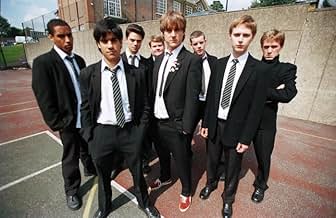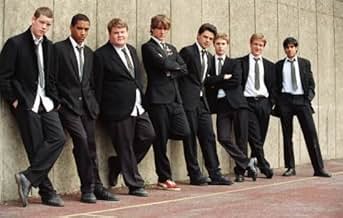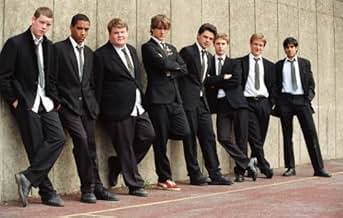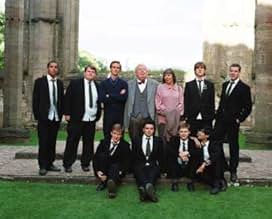Une classe indisciplinée d'adolescents doués et charmants est enseignée par deux professeurs excentriques et innovants, alors que leur directeur les pousse à être acceptés à Oxford ou à Camb... Tout lireUne classe indisciplinée d'adolescents doués et charmants est enseignée par deux professeurs excentriques et innovants, alors que leur directeur les pousse à être acceptés à Oxford ou à Cambridge.Une classe indisciplinée d'adolescents doués et charmants est enseignée par deux professeurs excentriques et innovants, alors que leur directeur les pousse à être acceptés à Oxford ou à Cambridge.
- Réalisation
- Scénario
- Casting principal
- Nomination aux 2 BAFTA Awards
- 2 victoires et 15 nominations au total
Avis à la une
About a group of young British Oxford and Cambridge hopefuls who are being trained by their teachers to achieve this goal, "History Boys" is a film portraying young people at school that is the farthest thing from American, and that's a good thing. No characters fall into obvious stereotypes and they are all highly intelligent, gifted individuals. The boys aren't being educated to be smart, they're being challenged in their thinking and subsequently being challenged as people.
The subplot and controversy of the film is an incident involving misconduct between a student and the boys' primary teacher, Hector, played by Richard Griffiths who is most famous for his role as Uncle Vernon in the Harry Potter series. Homosexuality or the questioning of sexuality and sexual drives and the desire to please others that one is fond of (in the broadest sense) is a major undertone and many times a player in the film's events. It's a bit confusing, but it adds something more material to a film that often times seems to be footage of well-read individuals discussing literature. Anyone who is turned off by scholarly behavior and thought could not possibly enjoy this film because they'd feel bored and alienated.
The actors, all men mostly, are superb in the film, but Frances De La Tour while a definite supporting character carries her own power on the screen. The acting and characters are really the most important element of this film. It takes not time to establish its characters and relationships-you have to see them develop and insinuate them based on character interactions throughout the film. Since the film is mostly talking, there is a lot of opportunity for that.
While the viewer does feel very much on the outside of the plot, the actors and characters do tend to keep the interest level up and the ending is very nice and effective. The result is something much more meaningful and not nearly as gimmicky as the title "The History Boys" suggests.
Apart from the boys, the two main characters are two of their teachers. Hector, an elderly man approaching retirement, is the general studies teacher whose role is to give the boys some general cultural background. He has a deep love of learning and believes strongly in the value of knowledge for its own sake. He has, however, become something of a figure of fun to the boys, partly because of his portly figure and his occasionally eccentric teaching style, but mostly because he is a homosexual (although trapped in an unhappy marriage), given to fondling his pupils, especially when giving them a lift on his motorcycle.
Irwin is a young history specialist brought in by the school to coach the boys for this examination. Unlike Hector, who has a deep reverence for truth as an absolute value, Irwin takes the Pontius Pilate line, "what is truth?", and encourages the boys to question received ideas about history. Like Hector, he too is homosexual, and becomes involved with Dakin, one of the boys. Dakin, who is bisexual, is also having an affair with Fiona, the headmaster's attractive secretary; another boy, Posner, who is just realising that he is gay, has an unrequited crush on Dakin.
Bennett's play was recently used by A A Gill, the left-wing TV critic of the "Sunday Times", as a stick with which to beat conservative historians. (He was thinking of the likes of Niall Ferguson, Andrew Roberts and David Starkey). He compared their revisionist approach to history to that of Irwin which he saw as intellectually dishonest, mere contrarianism for the sake of stirring up controversy (and publicity). That seemed to me, however, to be a misinterpretation. Bennett was not criticising historians who seek to re-evaluate the past rather than simply repeating traditional received ideas. Irwin may not be interested in truth for its own sake, but his approach to history is advocated less as a method of philosophical inquiry than as an exam-passing technique, his argument being that a deliberately controversial approach is more likely to impress Oxbridge dons jaded from marking too many papers. (In any case, some of Irwin's ideas- such as the claim that the Allies as well as the Germans were to blame for the outbreak of World War One- would not have been particularly controversial among historians in the eighties).
The film has been criticised for its homosexual themes, some reviewers going so far as to attack Bennett for allegedly defending paedophilia, which strikes me as another misconception. The boys in this film would all be aged eighteen or nineteen, and therefore of the age of consent, even for homosexual acts. The issue which Bennett raises is not "Is paedophilia defensible?", but "Are sexual relationships appropriate between teachers and pupils, regardless of age?", and his answer appears to be "no". Hector's penchant for fondling his pupils has, despite his gifts as a teacher, led to his becoming a laughing-stock and diminished his authority among the boys. Bennett certainly concentrates on homosexuality (apart from the Dakin-Fiona affair, there is surprisingly little- for a film about teenage boys- mention of heterosexual relationships), but it must be remembered that he is himself gay and, like most writers, concentrates on those issues which are most important in his own life. The film would doubtless be very different, and possibly more popular with heterosexual audiences, if the scriptwriter had been heterosexual. It would, however, be unfortunate if audiences allowed themselves to be dissuaded from seeing the film.
I felt that Bennett raised some potentially interesting themes which he did not pursue, such as the female teacher's feminist comments about the role of women in history and the discussion about whether the Holocaust is a subject that can be studied by historians like any other, but it seems to me that the film was not so much a film of ideas as a study in personalities and relationships. Richard Griffiths was very good as Hector, bringing out both sides of his personality. On the surface Hector is a larger-than-life, jovial character, ever ready for a laugh with the boys, but beneath that surface he is a sensitive, often unhappy, man. I also liked Stephen Campbell Moore's cynical but also vulnerable Irwin and Clive Merrison's pompous, autocratic headmaster (even if he was a bit of a caricature). The boys mostly emerged as distinct personalities in their own right- the handsome, cocksure Dakin, the shy, tormented Posner, the hearty sportsman Rudge, and so on.
The other thing I liked about the film was that, in spite of some serious themes and a tragic denouement, it is often brilliantly funny. Like a number of other reviewers I was particularly struck by the scene, played all in French without subtitles, where Hector gets the boys to act out a scene in a brothel and then (when the headmaster unexpectedly enters) tries to pretend that they were re-enacting a scene from a wartime hospital! There are also some perceptive one-liners, from Hector Irwin and the boys, such as the paradoxical, but often true, observation that the best way to forget something is to commemorate it. This is a film with much to enjoy, quite apart from the pleasures of nostalgia. (I attended a grammar school very similar to this one in the late seventies before going to Cambridge). 7/10.
The other reason is because the story is one beyond social judgment. Perhaps this is purposeful because being written, produced, directed, and acted by English people, class-consciousness is surely existent among them. But that's what I love so much about this film. The audience, in order to understand and enjoy it, must release themselves from the scrutiny of general culture over many, mostly sexual, aspects of life. The film is not about homosexuality, but homosexual goings-on exist prevalently in the story. It's also treated very nonchalantly, and many straight boys are free of any personal sexual burdens that would inhibit them from partaking. The very talked-about homosexual element of the film exists as the most direct example and also the core of the basis of the story, which is the pressure of society's judgmental and devastatingly interfering nature with many things that, if one were truly understanding, would not judge or interfere with. This extends to greater and more complex idealism in the script, such as the philosophy and meaning of education, the satisfactory or unsatisfactory pursuit and outcome of success, the importance of art and poetry, and the point of studying history.
I believe that The History Boys is an extremely important movie, and the fact that it lasted for a single week at a small theater here in Cincinnati is despicable and glaringly, stupidly contradictory to its message.
The beauty - and also the shortfall - of The History Boys is that people who are steeped in theatre made it. With the modern genius of playwright Alan Bennett transferring stage to screen we can be grateful that his masterpieces will reach a wider audience. But this is Bennett-lite, and almost makes us long for the original, full-length work. There is a notable absence of cinematic flourish - use of lighting, camera-work, images and subtleties unique to the silver screen that could have lifted the spirit of The History Boys to something that is beyond the physical limitations of the original stage. There is nothing here that could not have been portrayed equally well there - which leads us to conclude that, apart from it being a more accessible medium, the film is nothing more than a shortened and only mildly adjusted copy of the play. All the actors have the same, excellent projection of voice and perfect intonation that carries well for a live performance but that lacks the sense of intimacy which the camera can bring. Facial expressions are slightly overemphasised, as befitting the stage, but lacking the subtlety usually required for good cinema. At times it sounds too much like a recitation or performance, resulting in an audience detachment that comes from not quite being able to believe in the reality of characters before us or the emotions they are going through. Director Nicholas Hytner (Center Stage, The Crucible, The Madness of King George) also has his roots firmly in theatre, yet his choice of subject matter has generally been so outstanding that he has reaped awards in spite of this clunky, stagey style (the one exception being The Object of My Affection - which was less well critically received). The History Boys is obvious BAFTA-bait but, like the Madness of King George, its pluses fortunately outshine its weaknesses, and the story, humour and intellectual substance are so engaging that you can be guaranteed lots of discussion afterwards with your fellow filmgoers.
In 1998, Bennett (who graduated from Exeter College Oxford in Medieval History) refused an honorary doctorate from Oxford in protest at its links with press baron Rupert Murdoch. If anybody has the background to tell an outrageously authentic and rebellious tale of a-list history students with homo-erotic leanings it must surely be Bennett. He skilfully navigates the ground between appealing to a predominantly gay audience and a mainstream one by sublimating much of the homosexual content beneath the time-honoured stiff upper lip of English public school tradition, and then including hilarious heterosexual content that makes seducing a woman into a war-game. Gilded epigrams, quotable quotes and the most stylish of double-entendres ('gobbets') flood our ears as the boys' literary skills are augmented with the most ingenious of schoolboy deceptions. An ad-libbed enactment of a brothel scene for a French class (where one of the lads removes his trousers for added realism) is transformed seamlessly to a battle front drama when the headmaster makes a surprise appearance. Literary references leap from Thomas Hardy and Keats to Brief Encounter and Carry On films, and this mind-enhancing (if questionable) juxtaposition is faultlessly analysed. The question of 'what is history' is pursued with some vigour, from the idea of 'subjunctive history' to Rudge's down to earth if academically challenged definition - just one effing thing after another. Different intellectual approaches are personified by teachers Hector (knowledge for its own sake, whether it seems useful or not), Irwin (flashes of insight and creativeness that stand out from the usual interpretations) and Mrs Lintott (who suggests radical reinterpretation from a feminist point of view, instead of history being the story of men's inadequate responses told from the point of view of other men).
If all this sounds like an overly cerebral experience, be assured that it races past so quickly that paying attention to the academic content is an optional extra. Lighter viewing can tune in unashamedly to the in-your-face humour, a great soundtrack (The Smiths, New Order, The Clash, The Cure) and additional musical interludes as the lads leap to an old piano and acquit themselves admirably with camp song routines.
Like the similarly highbrow Dead Poets Society and The Browning Version or the more basic Dangerous Minds, The History Boys relies for its emotional ballast on the familiar themes of seeing a successful adult in a promising student, and the frailty of the teaching process, especially when the teachers need to propel students to heights that they themselves have never reached. For all its failings, that it does so with the brilliance of one of our finest contemporary playwrights is reason enough to see it. With its classic portrayal of English institutions and education system it also, perhaps less justifiably, makes one kind of proud to be British.
I saw "The History Boys" yesterday at The Fine Arts - Popular Center in San Juan, Puerto Rico. It is excellent. If you have a closed or narrow, rigid mind, don't go. In order not to be offended by the language, you need to be a Metro Man or a Metro Woman. It is downright blunt at times. The blunt language is not to be shocking or porno, but to be brutally honest and upfront about important perceptions concerning love and tolerance.
I had a little trouble getting into the movie in the very beginning scenes. Too much was going on all at once. However, as soon as it involved the teenage boys having a one-on-one "educational" discussion with the out-of-the-closet gay teacher, the movie grabbed me and kept me until the very end.
There is one powerful scene where the teacher discusses a poem with a gay student. This gay student is also Jewish but his gayness is what makes him different. There is an outstandingly handsome black student who is accepted in the school without conditions. A Moslem who is accepted as the black student is. A young, newly hired teacher is in the closet and does not know it. This new teacher can be completely honest with his teaching history but not with his own life. There are many very British types who are the complete opposite of American homophobes. There was no spiritually sick prejudice of diversity among these eight teenagers. They got along beautifully with each other. They had a wonderful respect for each person's uniqueness.
Gays and straights should see "The History Boys." It is not a gay movie per se. It is more a movie about being a loving and caring human being. It is about being true to one's self. I hope the day will come when more people in Puerto Rico and the states, especially the anti-gay bigots and religious zealots, will have the tolerant perceptions of these eight teenage boys in Yorkshire, England, in 1983.
Le saviez-vous
- AnecdotesThe cast for this movie are the same cast who appeared in the original play at the National Theatre in London, England.
- GaffesLockwood was killed in action with the York and Lancaster Regiment. They were disbanded in 1968.
- Citations
Hector: The best moments in reading are when you come across something - a thought, a feeling, a way of looking at things - that you'd thought special, particular to you. And here it is, set down by someone else, a person you've never met, maybe even someone long dead. And it's as if a hand has come out, and taken yours.
- Crédits fousAt the beginning of the film, the title - "The History Boys" - is taken letter by letter from random parts of an essay on the dissolution of the monasteries, a common history topic, which the History Boys themselves write later on in the film.
- Bandes originalesL'Accordéoniste
Music by Michel Emer
Lyrics by Michel Emer
© 1945 S.E.M.I., France / Peer Music (U.K.), Ltd., London
Performed by Samuel Barnett & Jamie Parker
Meilleurs choix
- How long is The History Boys?Alimenté par Alexa
Détails
- Date de sortie
- Pays d’origine
- Site officiel
- Langue
- Aussi connu sous le nom de
- The History Boys
- Lieux de tournage
- Sociétés de production
- Voir plus de crédits d'entreprise sur IMDbPro
Box-office
- Budget
- 2 000 000 £GB (estimé)
- Montant brut aux États-Unis et au Canada
- 2 706 659 $US
- Week-end de sortie aux États-Unis et au Canada
- 100 803 $US
- 26 nov. 2006
- Montant brut mondial
- 13 407 101 $US
- Durée
- 1h 49min(109 min)
- Couleur
- Mixage
- Rapport de forme
- 1.85 : 1





































